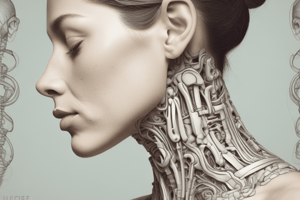Podcast
Questions and Answers
Which structure passes through the foramen transversarium?
Which structure passes through the foramen transversarium?
What is the name of the muscle located immediately in front of the vertebral bodies?
What is the name of the muscle located immediately in front of the vertebral bodies?
Which nerve is located between the internal jugular vein and the common carotid artery in the carotid sheath?
Which nerve is located between the internal jugular vein and the common carotid artery in the carotid sheath?
What is the name of the bony process that has an anterior and a posterior tubercle?
What is the name of the bony process that has an anterior and a posterior tubercle?
Signup and view all the answers
How many cervical nerves are there in the cervical region?
How many cervical nerves are there in the cervical region?
Signup and view all the answers
Which muscle is responsible for headaches and spasms?
Which muscle is responsible for headaches and spasms?
Signup and view all the answers
What is the name of the fascia that splits to enclose the two muscles?
What is the name of the fascia that splits to enclose the two muscles?
Signup and view all the answers
Which structure is located in the angle between the vertebral block and the larynx-pharynx block?
Which structure is located in the angle between the vertebral block and the larynx-pharynx block?
Signup and view all the answers
How many cervical vertebrae are there?
How many cervical vertebrae are there?
Signup and view all the answers
Which nerve is located below the 7th cervical vertebra?
Which nerve is located below the 7th cervical vertebra?
Signup and view all the answers
Study Notes
Neck Anatomy
- A 3-month-old girl's head seems to be flexed to the right and her head rotated to the left, indicating a possible case of Torticollis, which is caused by tightness of the Sternocleidomastoid (SCM) muscle.
Surface Anatomy of the Neck
- The laryngeal prominence (Adam's Apple) is an important surface feature in the anterior part of the neck, formed by the thyroid cartilage.
- In males, the angle between the two laminae of the thyroid cartilage is narrow, while in females, the angle is wider.
- The thyroid cartilage lies at the level of the fourth and fifth cervical vertebrae (C4,5) and rises during swallowing.
- The hyoid bone lies superior to the thyroid cartilage, at the level of the body of the third cervical vertebra (C3), and moves during swallowing.
- The hyoid bone is U-shaped, with a body and lesser and greater horns.
Bony Landmarks
- The transverse process of the atlas (C1 vertebra) can be felt by deep palpation between the angle of the mandible and the tip of the mastoid process.
- The cricoid cartilage, part of the laryngeal skeleton, is located at the level of the 6th cervical vertebra, where the pharynx joins the esophagus and the larynx and trachea join each other.
- The trachea can be palpated just superior to the jugular notch (Abiva) between the medial ends of the clavicle and the external occipital protuberance.
Plan of the Neck
- The neck can be divided into two main blocks: the musculo-vertebral block and the pharynx-larynx block.
- The musculo-vertebral block consists of the cervical vertebrae and the muscles grouped around them, bound together by a dense layer of prevertebral fascia.
- The pharynx-larynx block is placed in front of the musculo-vertebral block, composed of the pharynx and larynx, partially enclosed in a thin sheath of fascia called the pre-tracheal fascia.
- The carotid sheath is a vascular compartment that fills in the angle between the vertebral block and the larynx-pharynx block, containing the internal jugular vein, the common or internal carotid arteries, and the vagus nerve.
Muscles of the Neck
- The longus colli, scalenus anterior, scalenus medius, scalenus posterior, levator scapulae, and splenius capitis are muscles that make up the musculo-vertebral block.
- The semispinalis capitis is a muscle that can cause spasms and headaches.
Cervical Nerves
- There are eight cervical nerves, but only seven cervical vertebrae in the cervical region.
- Each spinal nerve is located above the vertebra with the same number, except that the nerve C8 is below the 7th cervical vertebra.
- The vertebral artery runs vertically through the foramina transversaria.
Studying That Suits You
Use AI to generate personalized quizzes and flashcards to suit your learning preferences.
Description
Identify the anatomical structure affected in a 3-month-old girl's neck, presenting with torticollis symptoms.




